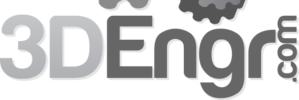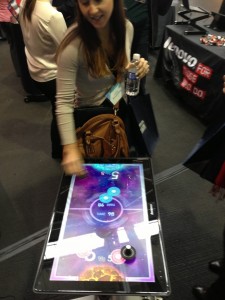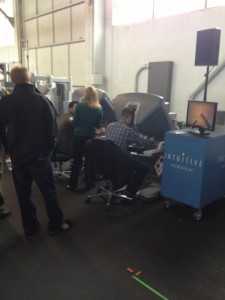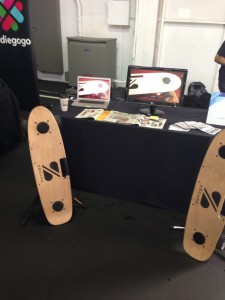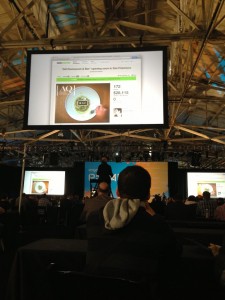Last weekend I had the opportunity to attend Engadget first ever “Engadget Expand” conference. Billed as event “designed from the ground up for technology fans” it seemed like a perfect fit. Before the event I went through all of the videos for the included Insert Coin competition, read up on the various speakers and exhibitors, and generally got excited for my first foray into the consumer tech conference world.
Exhibitors:
Overall the event was a nice mix of items and had an authentic feel to it. Certainly it did not compare to the mega shows, like CES, for scale and polish but that also meant exhibitors were ready and eager to engage with all attendees and the branded sponsorship’s were more subtle and well integrated. Lenovo had a fun display for a large touch screen that doubled as a coffee table (with an additive version of air hockey).
It was also tough to tell the exhibitors from full on sponsors. One company, Intuitive Surgical, had setup a few machines that likely cost more than a house (OK, maybe not a house in San Fran). They were letting pretty much everyone sit down and practice putting rubber bands on tiny objects using a robotic system usually found in high end surgical centers.
No tech convention would be complete though without something for all the non-geeks. Enter the ZBoard, a powered skateboard which showed up with tons of demo boards for attendees to sample. Nothing like watching “tech enthusiasts” try to maneuver a souped up skateboard through a crowded convention hall.
Speakers:
Kickstarter Co-Founder Yancey Strickler
The speaking agenda, held on a single main stage, kick off with a presentation from Yancey Strickler or Kickstarter. He spoke about the growth and development of his crowd funding platform, how different hardware devices had become successful on the site and delivered some simple but impactful stats about the site (all pulled from a cool page on their site Kickstarter Stats)
None of Yancey’s information was about new product launches, though he did field one question noting that Kickstarter plans to expand to new markets just as soon as they can figure out the legal issues. Instead he used the time to showcase how the new platform had been leveraged by innovative thinkers. To showcase the impact Kickstarter has had on the (albeit tech forward) community of San Francisco he pulled up slides of campaigns which he encountered on the street. One of them was a restaurant I happened to be at the night before, AQ, which is easily the most delicious Kickstarter campaign I have encountered and is now one of my favorite San Francisco restaurants.
3D Printing Goes Mainstream:
After the presentation by Yancey one of Engadget’s editors, Brian Heater, took the stage to moderate a discussion on 3D Printing. The three panelists, Hod Lipson of Cornell, Max Lobovsky of FormLabs, and Avi Reichental of 3D Systems, bantered about the future of 3D printing and how it may (or may not) make it’s way into every home. Here are a few notes from each of the speakers:
Avi remarked that there has been huge growth in B2B sales of 3D printing, one of the great examples of that is Invisiline who produces hundreds of totally unique prints every day. This has transformed their ability to do business and provided created a scale-able business model. Since printers have become so much more accessible now the work to be done is on the UX and what can printing do for me and what new business will do with them. As for mainstream printing in the home the question “are these toys or are home printers more than that” still needs to be answered. The idea of a desktop printing is not enough what can it really be used for. He did note that 3D Systems plans to offer a chocolate printer by the end of 2013. A few rhetorical questions Avi asked that have yet to be answered (and will be addressed separately in later posts)
What can I do with a 3D printer for an 8 year old?
What new business models can be created?
What developments in materials will this delivery?
How will they change the retail experience?
Max Lobovsky, a researcher who is part of the team that just launched the most funded 3D printer on Kickstarter, said he is not convinced we’re headed for home printing, that everyone needs it. He also seemed to agree that much work needs to be done on materials and his company is positioned well to help with this since the founding group includes chemical and material experts.
Hod, who has helped support the Fab@Home project noted that Fab@Home was closed as they had essentially completed their goal. Now with so many open source files available to create your own printer there were more pressing topics for his team to research. One area was multi-material printers which he calims he is working on.
The second big area Hod discussed was that home printing was only a piece of the eco system of 3d printers that will bring additive manufacturing the mainstream. Some printers will live at a machine shop, at a bakery, at a car repair center, in the home and on factory floors. Each of these printers will have unique features and requirements. This of course is good news for any 3D printing companies since it means they will have a whole product line to support.
Overview:
Engadget put on an interesting and engaging first conference. As the kinks are worked out, word spreads, and the conference grows, Expand promises to offer a fun and accessible conference for consumers and fans of new technologies. I would not be surprised if in a few years Expand is a place to reveal amazing new devices, engage in social/physical platforms, and network with leaders in technology and development.
